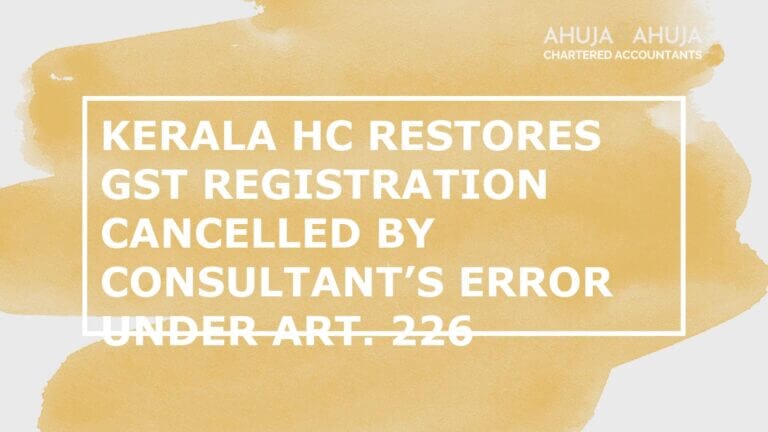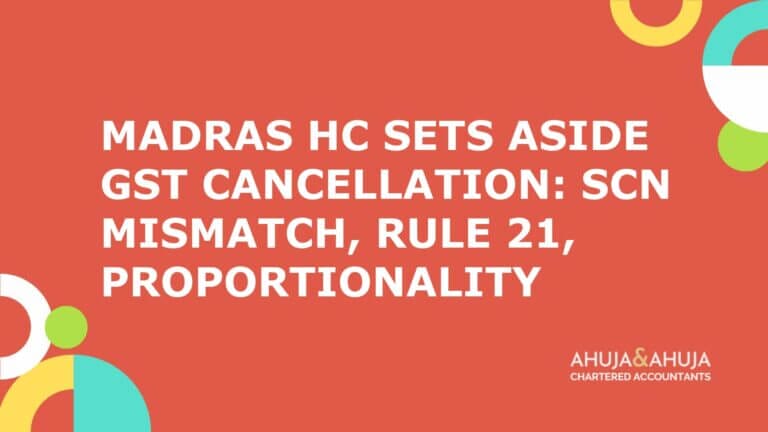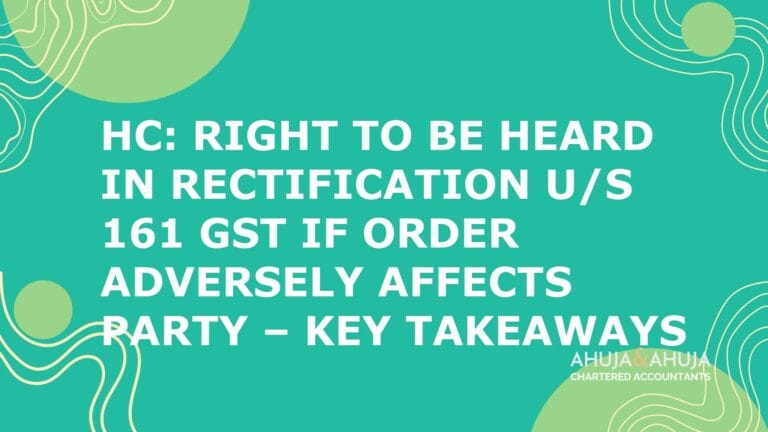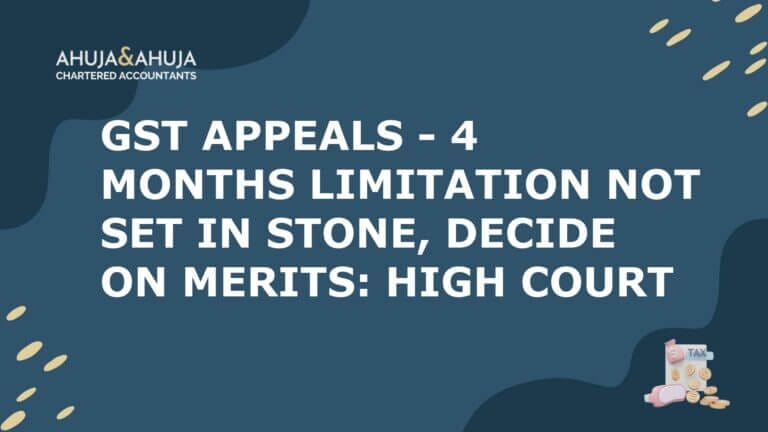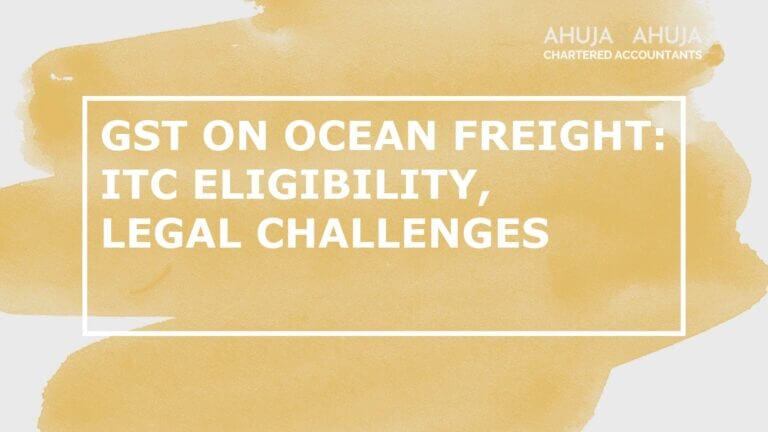Services Omitted from GST Registration Can’t Bar Zero-Rate Refund: AP High Court
GST, Zero-Rated Supplies, and a Refund Roadblock
The Goods and Services Tax (GST) regime in India was designed to simplify indirect taxation, especially for businesses engaged in cross-border trade. One of its cornerstones is the concept of “zero-rated supply”—a mechanism that allows exporters of goods and services to claim refunds of input taxes, ensuring that Indian exports remain globally competitive.
Yet, as with any ambitious reform, the devil lies in the details. The recent Andhra Pradesh High Court decision in M/s Alstom Transport India Ltd v. Union of India & Ors. (2025) shines a spotlight on a technical but crucial question: Can a business be denied a refund on zero-rated exports of services simply because those services weren’t listed in its GST registration at the time of supply?
This article unpacks the judgment, the legal and practical issues at stake, and what it means for businesses, tax professionals, and GST administrators.
The Core Issue: When Registration Details Become a Refund Hurdle
At the heart of the Alstom case was a straightforward but high-stakes question:
If a taxpayer exports services and pays IGST, but those services were not specifically included in their GST registration certificate at the time of supply, can the authorities deny a refund of the tax paid?
Let’s break down the context:
- Alstom Transport India Ltd is a major player in manufacturing railway equipment and providing engineering services for metro projects.
- The company registered under GST as a supplier of goods. Later, it amended its registration to include services, but only after it had already exported engineering services and paid IGST on them.
- When Alstom claimed refunds for the IGST paid on these zero-rated service exports, the tax authorities rejected the claims. Their reasoning? Alstom’s registration, at the time of export, covered only goods—not services.
This led to a classic standoff:
- Tax authorities argued that refund eligibility is tied to the scope of registration. If services aren’t listed, no refund for service exports.
- Alstom countered that GST law doesn’t require such granular registration, and that being a “registered person” is enough.
Zero-Rated Supply: The Backbone of Export Incentives
To understand the stakes, it’s vital to grasp what “zero-rated supply” means under the IGST Act.
- Zero-rated supply includes exports of goods or services (or both), allowing the supplier to claim a refund of input taxes paid. For insights on similar topics, see our detailed GST refund services.
- The logic is simple: exports shouldn’t bear the burden of domestic taxes, keeping Indian goods and services competitive abroad.
In Alstom’s case, the company exported engineering services—squarely within the definition of zero-rated supply. The only wrinkle was the omission of “services” in its GST registration at the time of export.
Why Did Registration Details Become a Flashpoint?
GST registration is the gateway to compliance, entitling businesses to collect and remit tax, file returns, and claim refunds. The registration process (via Form GST REG-01) asks applicants to list their top five goods and services, but it doesn’t demand an exhaustive inventory. The certificate (Form GST REG-06) similarly doesn’t specify every supply line.
Yet, in Alstom’s case, the authorities treated the absence of “services” in the registration as a fatal flaw, denying refunds for service exports made before the registration was amended. This raised a fundamental question:
Is GST registration a functional identifier, or does it act as a restrictive license tied to specific goods and services?
Legal Framework: The Statutory Provisions in Play
The High Court’s analysis revolved around several key provisions:
- Section 16, IGST Act: Defines zero-rated supply and entitles registered persons to claim refunds on such supplies.
- Section 54, CGST Act: Lays down the process and eligibility for claiming refunds, including for zero-rated supplies.
- Section 2(94), CGST Act: Defines “registered person” as anyone registered under Section 22 or 24, except those with a Unique Identity Number.
- Section 22, CGST Act: Mandates registration for suppliers exceeding the turnover threshold, whether supplying goods or services.
- Section 25, CGST Act: Outlines the registration process, including amendments.
For an in-depth understanding of statutory provisions, check out this GST consultancy services resource.
The authorities’ stance was that only those registered for “services” could claim refunds for service exports. Alstom, on the other hand, argued that the law only requires registration—period.
The Practical Unfolding: Alstom’s Timeline and the Refund Rejection
- June 2019 onwards: Alstom began exporting engineering services, paying IGST and reflecting these in returns.
- August 2020: Applied to amend GST registration to include services.
- September 2020: Amendment approved.
- Refund claims: Filed for periods before the amendment, covering substantial sums.
- Tax authorities’ response: Rejected claims, citing the absence of “services” in the registration during the relevant period.
This sequence set the stage for a legal showdown, with implications for countless businesses navigating the GST landscape. For companies seeking guidance on registrations and amendments, our business setup services can be valuable.
Dissecting the Legal Arguments and the Court’s Reasoning
When the matter reached the Andhra Pradesh High Court, both sides marshaled their best legal artillery. The petitioner, Alstom, and the tax authorities presented sharply contrasting readings of the GST law—each with significant implications for exporters and the GST regime as a whole.
Petitioner’s Stand: Registration Is Not a Straitjacket
Alstom’s counsel argued that the GST framework does not require a taxpayer to itemize every good or service at the time of registration to be eligible for refunds. Their key points:
- Statutory Construction: The CGST and IGST Acts only require that a person be “registered” to claim a refund on zero-rated supplies. Nowhere do the statutes or rules demand that the registration certificate must specifically list each good or service supplied.
- Functional Purpose of Registration: The registration certificate is meant to identify the taxpayer for compliance and administration—not to restrict the scope of their business activities.
- Forms and Rules: While Form GST REG-01 asks for the top five goods and services, it does not require an exhaustive list. The registration certificate (REG-06) does not enumerate all possible supplies.
- No Legislative Mandate: There is no provision in the CGST or IGST Acts, or in the Rules, that bars refund claims for supplies not expressly mentioned in the registration.
In essence, Alstom’s position was that the law’s intent is to facilitate exports and refunds, not to create technical traps for the unwary.
Respondents’ Counter: Literalism and the Timing of Amendments
The tax authorities, for their part, took a more literal approach:
- Express Inclusion Required: They argued that Section 22 of the CGST Act requires registration for both goods and services. Since Alstom’s registration initially covered only goods, it was not entitled to refunds for services exported before the amendment.
- Timing is Everything: The authorities pointed to the date of amendment—September 2020—as the cut-off. Refunds for service exports prior to this date, they contended, were not permissible.
- Section 16(3) of IGST Act and Section 54 of CGST Act: These, they claimed, restrict refund eligibility to registered persons “in relation to” the supply in question.
Their stance, if accepted, would mean that any omission—however inadvertent or technical—could have severe financial consequences for exporters.
The Court’s Analysis: Text, Purpose, and Practicality
The High Court undertook a careful reading of the statutory provisions, forms, and the practical realities of GST compliance.
- Zero-Rated Supply and Refund Entitlement: Section 16 of the IGST Act entitles any “registered person” to claim refunds on zero-rated supplies—whether goods, services, or both. Section 54 of the CGST Act, while using the phrase “any person,” is read in conjunction with Section 16 to mean “registered person.”
- Definition of Registered Person: Section 2(94) of the CGST Act defines this term broadly—as anyone registered under Section 22 or 24, with no reference to the specific nature of supplies.
- Registration Process and Forms: The Court noted that the registration process (Section 25, CGST Act; Rule 19, CGST Rules) and the forms (REG-01, REG-06) do not require an exhaustive listing of all goods and services. The forms ask for the “top five” items, but this is for administrative convenience, not as a legal limitation.
- No Statutory Bar: Crucially, the Court found no provision in the Acts or Rules that mandates denial of refunds simply because a particular service was not listed in the registration at the time of supply.
The Court’s reasoning was both textual and purposive:
- The law’s objective is to facilitate exports and ensure that taxes do not stick to outbound supplies.
- Registration is a compliance tool, not a restrictive license.
- Denying refunds on technical grounds, absent a clear statutory bar, would defeat the purpose of zero-rating.
GST Registration Amendments: Process and Practical Lessons
The Court also examined the process for amending GST registration:
- Rule 19, CGST Rules: Allows for amendment of registration details, including the addition of new goods or services.
- Alstom’s Case: The company applied for amendment in August 2020, which was approved in September 2020. However, the services in question had been exported (and IGST paid) from June 2019 onwards.
- Court’s View: The timing of the amendment did not affect the company’s status as a registered person. The absence of “services” in the original registration was not a valid ground to deny refunds for the earlier period.
No Statutory Basis for Denial: The Court’s Decisive Finding
Perhaps the most significant aspect of the judgment was the Court’s clear statement:
There is no statutory provision—neither in the CGST Act, the IGST Act, nor in the Rules—that justifies denying a refund for zero-rated supplies merely because the specific service was not listed in the registration certificate at the time of supply.
The authorities’ approach, the Court held, was not supported by law and ran counter to the objectives of the GST regime.
Implications for Businesses: Clarity Amidst Complexity
This decision provides much-needed clarity for businesses that supply both goods and services:
- Refund Eligibility: As long as a business is registered under GST, it is entitled to claim refunds on zero-rated supplies—even if some goods or services were not listed in the registration at the time of supply.
- Registration Amendments: While it remains best practice to keep registration details up to date, inadvertent omissions will not, by themselves, bar refund claims.
- Documentation and Compliance: Businesses should maintain robust records—returns, invoices, amendment applications—to support their claims and demonstrate bona fide compliance. For professional assistance in these matters, GST refund services can be crucial.
Broader Impact, Professional Guidance, and Forward-Looking Practice after the Alstom Decision
The Andhra Pradesh High Court’s ruling in the Alstom case doesn’t just resolve a technical dispute—it sends ripples across the GST landscape, shaping compliance strategies, refund administration, and professional advice for years to come.
Precedential Value and Systemic Impact
While the judgment was delivered by the Andhra Pradesh High Court, its reasoning is rooted in the central GST and IGST statutes, which apply uniformly across India. Here’s what this means in practice:
Precedent Beyond Andhra Pradesh?
Technically, the decision is binding only within Andhra Pradesh. However, because it interprets central legislation, it carries persuasive value for other High Courts and GST authorities nationwide. Unless a contrary judgment emerges elsewhere, this reasoning is likely to influence refund processing and dispute resolution across India.GST Administration and Policy
The judgment nudges tax authorities to focus on substance over form. GST officers may need to revisit standard operating procedures for refund claims, ensuring that technical omissions in registration details do not become a pretext for denial—unless expressly mandated by law.Potential for Further Litigation
Some ambiguity remains for edge cases—such as where a business’s main activity changes, or where authorities suspect deliberate concealment. Until the GST Council or CBIC issues a clarificatory circular, occasional disputes may persist, but the Alstom decision sets a clear pro-taxpayer tone, emphasizing the importance of GST litigation services.
Professional Advisory: What Should Accountants and Consultants Do Now?
For tax professionals, the Alstom judgment is both a shield and a checklist:
Advise on Registration Granularity
While the law does not require exhaustive listing of every good or service, it is prudent to ensure that all major business lines are reflected in the GST registration. Proactive amendments reduce the risk of queries or delays.
Documentation is King
To support refund claims, businesses should retain:GST returns showing export turnover and tax payment
Invoices and shipping documents
Contracts or agreements for export of services
Copies of amendment applications and acknowledgments
Correspondence with GST authorities
Best Practices for Compliance
Conduct periodic “registration audits” to ensure all current goods and services are covered; consider leveraging GST audit services.
Maintain an internal checklist for prompt amendment whenever the business profile changes.
Foster open communication with GST officers, especially when seeking refunds for periods before a registration amendment.
Practical Scenarios and User Queries Addressed
Retrospective Refunds Pre-Amendment
If a business exported services before amending its GST registration to include those services, it can—per the Alstom precedent—claim refunds for that period, provided it was otherwise a registered person and all other conditions are met.Remedies for Similar Refund Rejections
If a refund is denied on the ground that a service was not listed in the registration, businesses should:File a detailed representation citing the Alstom judgment
Escalate to appellate forums or High Court if necessary
Ensure all supporting documentation is in order
Exporters with Incomplete Registrations
The key is to act promptly: amend the registration as soon as an omission is noticed, and maintain clear records of all supplies and tax payments. The risk of refund denial on technical grounds is now significantly reduced.
Policy and Practice: Charting the Way Forward
Enhancing GST Registration Processes
The GST Council and CBIC may consider clarifying the purpose of listing goods/services in registration forms—emphasizing that it is for administrative convenience, not a legal restriction.Dispute Prevention: Best Practice Checklist
Regularly review the business’s supply profile
Update GST registration proactively using reliable GST registration services
Document all amendments and communications carefully
Dynamic Compliance
Integrate GST compliance with business process changes—so that new services or goods are reflected in registration without delay. Professional support from GST consultancy services can help ensure smooth transitions.
Conclusion: Clarity, Consistency, and Confidence for Taxpayers
The Alstom decision decisively affirms that GST registration is not a straitjacket. As long as a business is registered, it cannot be denied zero-rated refunds merely because a particular service was omitted from the registration certificate at the time of supply. This approach aligns with the spirit of GST—facilitating exports, reducing technical barriers, and fostering a compliance environment based on substance, not form.
Action Points:
- For Taxpayers: Review and update GST registration details, but don’t fear technical omissions if you are otherwise compliant.
- For Practitioners: Advise clients to maintain robust documentation and act swiftly on registration amendments.
- For GST Administrators: Focus on the legislative intent and avoid technical denials unless expressly required by law.
As GST matures, judgments like Alstom’s pave the way for a more business-friendly, predictable, and fair tax environment—where clarity and consistency are the new normal.
Disclaimer
The materials provided herein are solely for educational and informational purposes. No attorney/professional-client relationship is created when you access or use the site or the materials. The information presented on this site does not constitute legal or professional advice and should not be relied upon for such purposes or used as a substitute for professional or legal advice.


